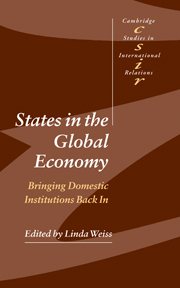Book contents
- Frontmatter
- Contents
- List of figures
- List of tables
- List of contributors
- Preface
- 1 Introduction: bringing domestic institutions back in
- Part I The resilience of welfare states
- Part II New economic challenges, changing state capacities
- 5 France: a new ‘capitalism of voice’?
- 6 The challenges of economic upgrading in liberalising Thailand
- 7 Building institutional capacity for China's new economic opening
- 8 New regimes, new capacities: the politics of telecommunications nationalisation and liberalisation
- 9 Ideas, institutions, and interests in the shaping of telecommunications reform: Japan and the US
- 10 Diverse paths towards ‘the right institutions’: law, the state, and economic reform in East Asia
- Part III Governing globalisation
- List of references
- Index
- CAMBRIDGE STUDIES IN INTERNATIONAL RELATIONS
10 - Diverse paths towards ‘the right institutions’: law, the state, and economic reform in East Asia
Published online by Cambridge University Press: 22 September 2009
- Frontmatter
- Contents
- List of figures
- List of tables
- List of contributors
- Preface
- 1 Introduction: bringing domestic institutions back in
- Part I The resilience of welfare states
- Part II New economic challenges, changing state capacities
- 5 France: a new ‘capitalism of voice’?
- 6 The challenges of economic upgrading in liberalising Thailand
- 7 Building institutional capacity for China's new economic opening
- 8 New regimes, new capacities: the politics of telecommunications nationalisation and liberalisation
- 9 Ideas, institutions, and interests in the shaping of telecommunications reform: Japan and the US
- 10 Diverse paths towards ‘the right institutions’: law, the state, and economic reform in East Asia
- Part III Governing globalisation
- List of references
- Index
- CAMBRIDGE STUDIES IN INTERNATIONAL RELATIONS
Summary
In the wake of the global financial crisis that began in 1997, an influential body of opinion arose which argued that a primary cause of the crisis in the affected countries was a lack of institutional transparency and accountability, and more generally, an absence of the rule of law. This argument reflected both the nature of the financial crisis itself and the likely policy remedies for it, and a growing international consensus in the 1980s and 1990s that different law traditions had differential effects on economic development. More specifically, the argument was that a common law tradition was more likely to promote economic development because it was the best source of and predictor for the rule of law, transparency, and accountability. By the same token, the civil law tradition was more likely to privilege state intervention in economic processes, and to be less sensitive to concerns about the rule of law and transparency.
In this Chapter I will argue that however compelling this argument may be – and I will lay the argument out in some detail – legal traditions and institutions do not determine the nature of the state (although they may be reflected in it) or its likely role in the economy, nor do they critically determine the course of economic development. Therefore the current tendency of pointing to the ‘rule of law’ as an elixir which will fix various contemporary problems of development may simply be wrong, and it may reverse the causal arrows: instead of common law leading to a minimal state and the broadest extension of the market, or civil law leading to state intervention in the economy and corresponding shrinkage of market activity, there may be no relationship at all between forms of law and the role of the state.
- Type
- Chapter
- Information
- States in the Global EconomyBringing Domestic Institutions Back In, pp. 200 - 222Publisher: Cambridge University PressPrint publication year: 2003
- 7
- Cited by

